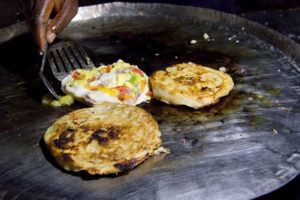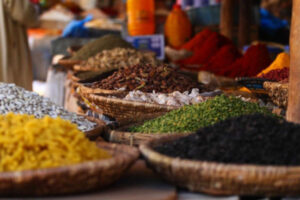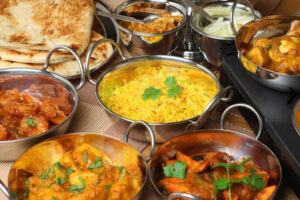Tasting Zanzibar -
The Spice Islands' Flavours
Zanzibari cuisine is a beautiful mix of different influences, shaped by the rich cultural and ethnic tapestry of Zanzibar and the Swahili heritage. It’s a mix of culinary traditions, from the Bantu, Arab, Portuguese, Indian, British and even Chinese cuisines.
The first people to settle in Zanzibar were Bantus from the mainland of Tanganyika. They were mostly fishermen, their diet consisted of seafood, such as tuna, mackerel, lobster, squid, octopus and oysters. The Bantus brought other ingredients and recipes to Zanzibar that are found in today’s Zanzibari cuisine. These include common beans, sweet potatoes, manioc chips, yams and plantains.
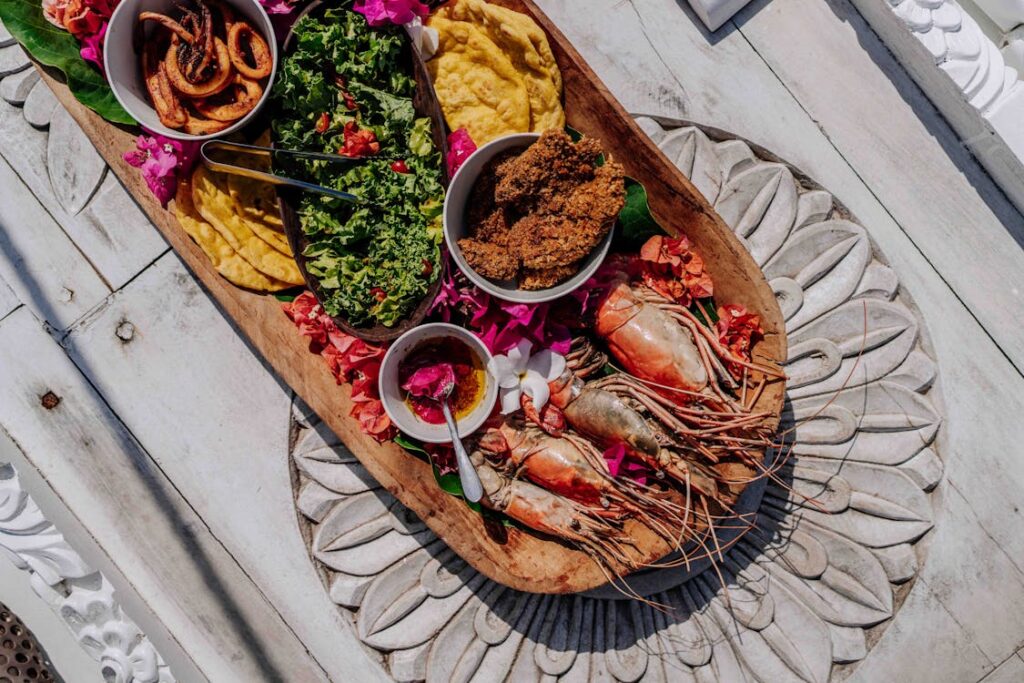
This guide is all about the delicious dishes you simply have to try in Zanzibar. We’re talking mouth-watering plates like pilau, biryani, chapati, and fresh seafood. Whether you’re craving the authentic flavours of local food stalls and family-run kitchens or the charming vibes of beachside restaurants steeped in tradition. Kitamu!
From the comforting scent of clove wafting through the air to the warm welcome you’ll find at every table, Zanzibar’s food is like a love letter that you can savour with every bite.
Spices that define Zanzibar cuisine – what a treat!
Clove – an amazing spice that made Zanzibar the world’s largest exporter!
Cardamom and Cinnamon – the perfect pairing! Warm and fragrant, these two spices create a delicious and comforting aroma.
Turmeric and Cumin – are the perfect example of earthy and foundational flavours!
Tamarind and Lime – are the perfect way to make stews and drinks tangy and refreshing!
Karibu sana!
Pilau
An absolutely amazing festive meal in Tanzania!
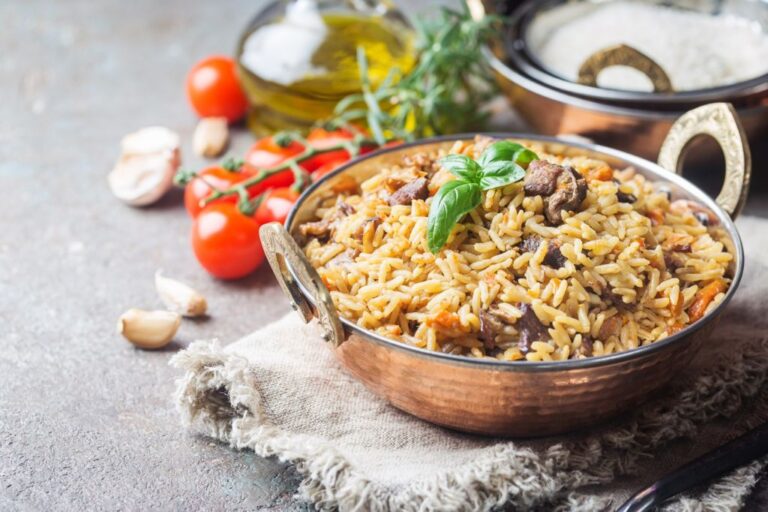
Pilau is one of those dishes that just has to be on the menu when visiting Tansania Especially on the stunning Zanzibar Islands, pilau is a staple food of the locals and is even served in most luxury hotels and resorts, making it a must-try dish for anyone visiting this beautiful country!
It’s absolutely amazing – it’s made with a mixture of rice and any meat like chicken, beef, camel, goat. Added with potatoes, onions, garlic and lots of spices. The smell of pilau is nothing short of spectacular, a symphony of spices blending together to create a unique and exquisite taste sensation.
The secret to the perfect flavour and aroma is to cook your food in a heavy-bottomed pot over charcoal. This method ensures that the heat is spread evenly, allowing the flavours to infuse every dish.
The Zanzibaris absolutely love to cook this dish for special days and events! Whether it’s weddings, holidays, visitors coming home or at Friday, you’ll always find a delicious meal on the table.
The vegetarian interpretation of pilau is made with pumpkin or sweet potato and beans.
We are so excited to tell you about our incredible Spice Farm Tour! It’s the perfect way to try delicious local cuisine, and you’ll even get to cook your own Pilau from scratch!
Pweza wa Nazi - the Octopus in Coconut Curry
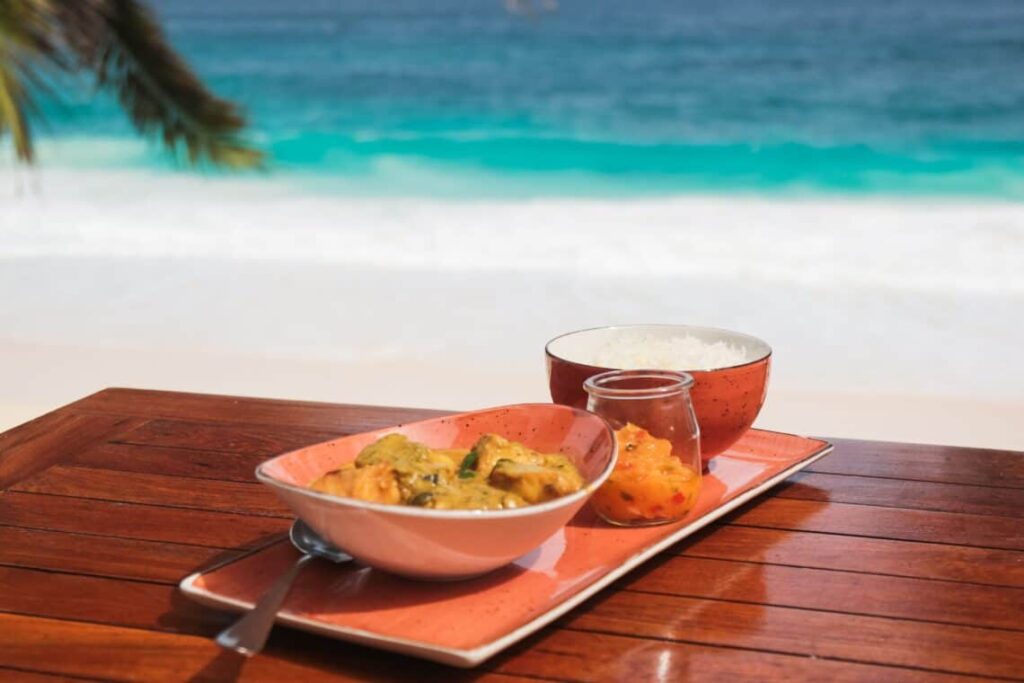
That sounds absolutely tropical! A coconut-infused stew with octopus is such a wonderful combination of flavors. The garlic and tomatoes will add great depth, while the turmeric will provide a warm, earthy note. Serving it with rice or flatbread is a perfect choice to soak up that rich sauce.
Here’s a simple recipe to help you recreate this dish:
Ingredients:
- 1 octopus, cleaned and cut into pieces
- 1 can (400 ml) coconut milk
- 2 tablespoons olive oil
- 4 cloves garlic, minced
- 1 onion, finely chopped
- 2 tomatoes, chopped (or 1 can of diced tomatoes)
- 1 teaspoon turmeric powder
- 1 teaspoon paprika (optional, for extra flavor)
- Salt and pepper to taste
- Fresh parsley, for garnish
- Cooked rice or flatbread, for serving
Instructions:
Prepare the Octopus: If using fresh octopus, you may need to tenderize it by boiling it in salted water for 45 minutes to an hour. If using pre-cooked or frozen octopus, skip this step and thaw it.
Sauté the Aromatics: In a large pot, heat the olive oil over medium heat. Add the chopped onions and minced garlic, sautéing until the onions are translucent and fragrant.
Add Tomatoes and Spices: Stir in the chopped tomatoes, turmeric, and paprika. Cook for about 5-7 minutes until the tomatoes begin to break down.
Cook the Octopus: Add the octopus pieces to the pot, stirring to combine with the tomato mixture. Pour in the coconut milk and bring to a gentle simmer. Season with salt and pepper.
Simmer: Let the stew simmer for about 30-40 minutes, or until the octopus is tender and infused with the flavors of the coconut and spices. Stir occasionally and adjust seasoning as needed.
Once the octopus is cooked, ladle the stew into bowls, garnish with chopped parsley, and serve hot with rice or flatbread.
The traditional method of fishing in Zanzibar is so interesting! It is practised at low tide by women who use spears and reef traps.
Mishkaki
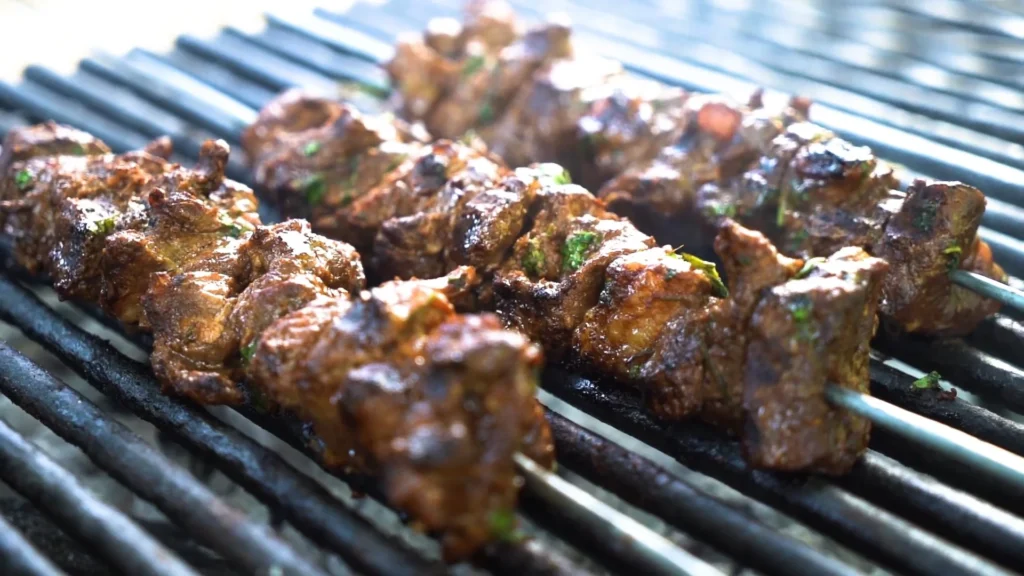
The tantalising scents of sizzling meat and mouth-watering spices fill the air in Zanzibar streets, creating an atmosphere of pure culinary excitement. Vendors expertly rotate skewers of succulent beef over hot coals, infusing them with a mouth-watering smoky richness. This iconic street food is known as mishkaki, featuring succulent beef kabobs marinated in a complex blend of flavors.
In Swahili, ‘mishkaki’ literally translates to ‘skewer’, describing how the meat is prepared. As you bite into the tender beef with hints of cumin, garlic, and chili, you’ll understand why mishkaki has been a favorite for generations.
Zanzibar Pizza
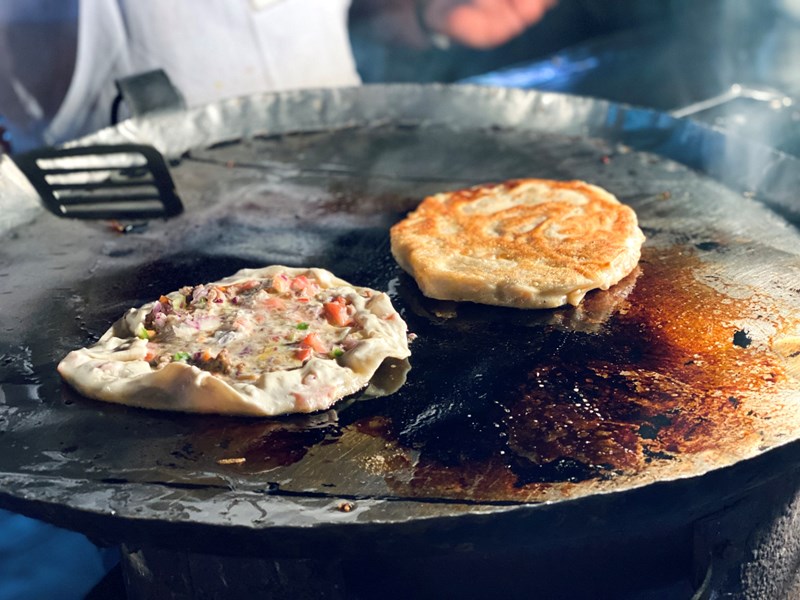
Zanzibar pizza is a really popular and delicious dish among the Zanzibar locals. You might not have imagined what it would look like, but you’ll love it when you try it! It’s a whole different ball game from Italian pizzas, and you might even wonder why it’s called a pizza.
It’s made with dough that’s been stretched thin, and it’s filled with all sorts of delicious meats (chicken, lobster, prawns, calamari, beef), depending on what you fancy. Then, it’s topped with an egg mixed with onion, mayonnaise, cheese and chilli sauce.
We would really recommend the Forodhani Night Market in Stone Town – it’s a really nice place where you can try this delicious dish. If you’re still feeling a bit unsure about where to start, don’t worry! You can always book our lovely Stone Town walking tour, which ends at the beautiful Forodhani Garden.
Maandazi

If you visit Zanzibar, you’ll see Maandazi in the local restaurants. You’ll find this is usually served for breakfast or dinner, and feel free to experiment and try it.
It’s a type of fried dish made up with wheat flour, coconut milk, sugar, cardamom, and yeast.
Maandazi is a really versatile dish, and can be served with a whole range of accompaniments to suit every taste. Whether you prefer it with coconut curry, spiced milk or chai.
Gently fried in a shallow pan until they’re a beautiful golden brown. You’ll often see Zanzibar mama’s selling them in bulk, balancing them on their heads – isn’t that great?
Vitumbua - Rice cakes
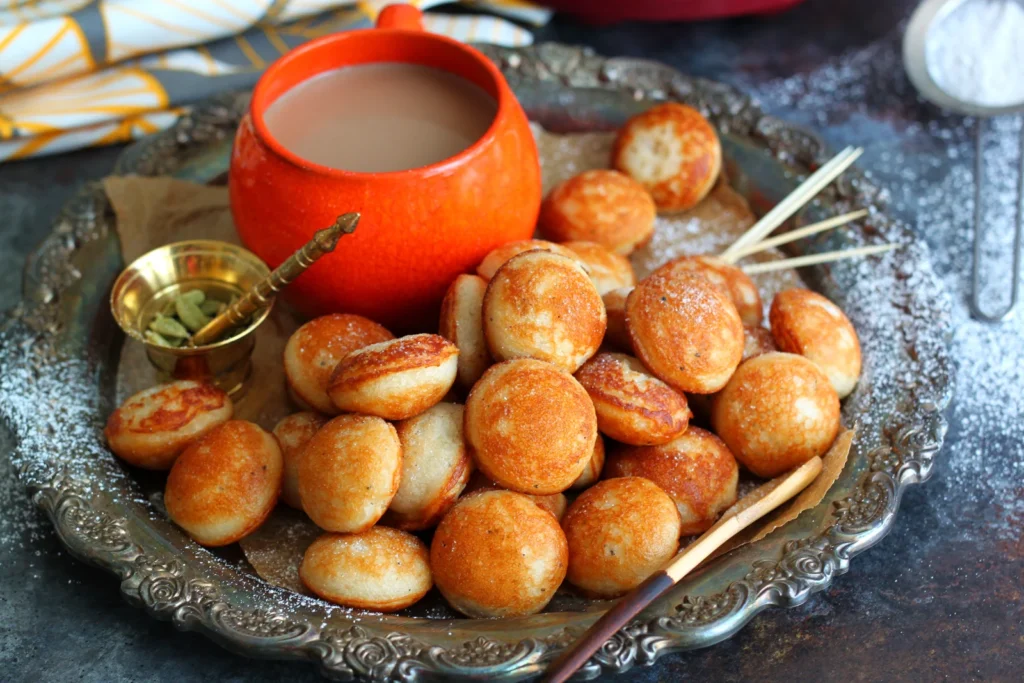
These lovely spongy rice cakes are cooked in cast iron pans and flavoured with cardamom and coconut. You can often find it being sold at bus stops and breakfast stalls.
Urojo
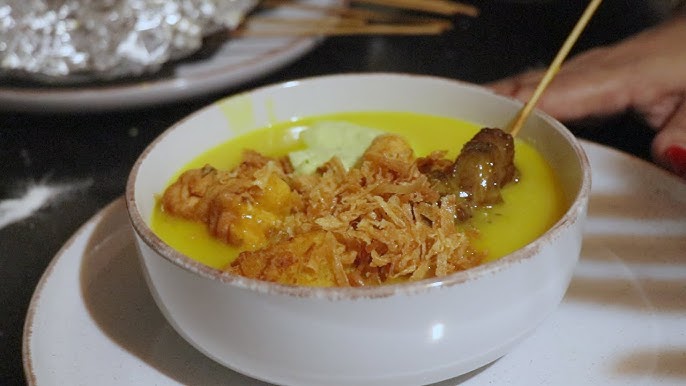
Urojo is also known as Zanzibar Mix. You must try this popular Zanzibar dish. It is a soup made from a mixture of small pieces of boiled potatoes, cassava chips, bajias, mashed potatoes, small pieces of grilled meat (mishikaki), boiled eggs, and it is finally spiced with fresh hot chilli and coconut chutneys.
Vegetarians can rest assured that this is not an issue. Urojo is vegetarian friendly, but only if you don’t mix with Mishkaki. Make sure you ask the restaurant staff.
Seafoods BBQ
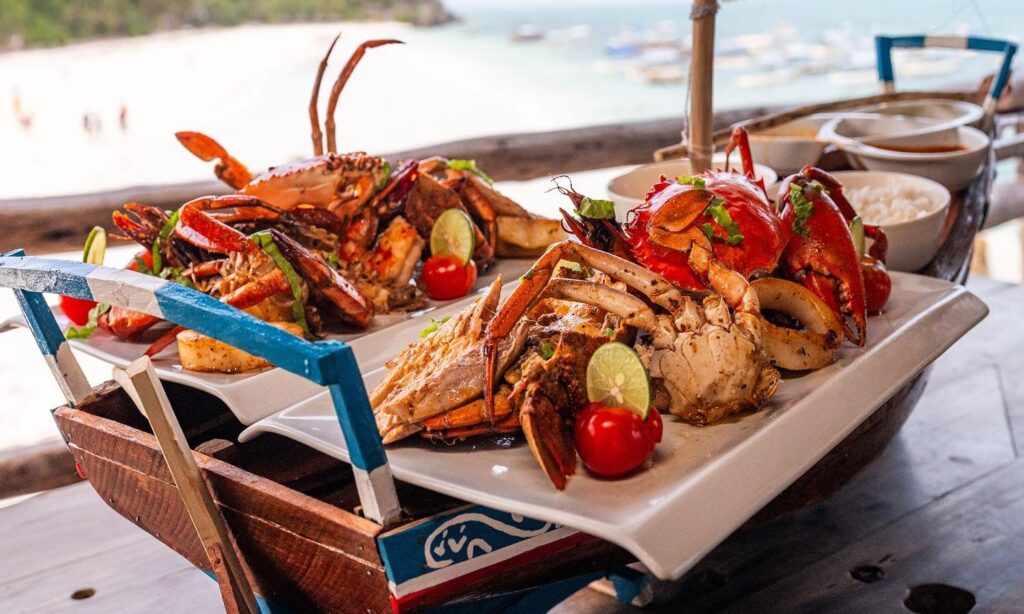
Zanzibar is known for its fantastic seafood, and a seafood BBQ is a must-try experience. You’ll find a variety of grilled fish, prawns, lobster, squid, and more, often seasoned with zanzibar spices. Popular options include snapper, barracuda, and octopus. Street vendors and restaurants offer this delicious option, making it easy to find and enjoy.
Chipsi Mayai
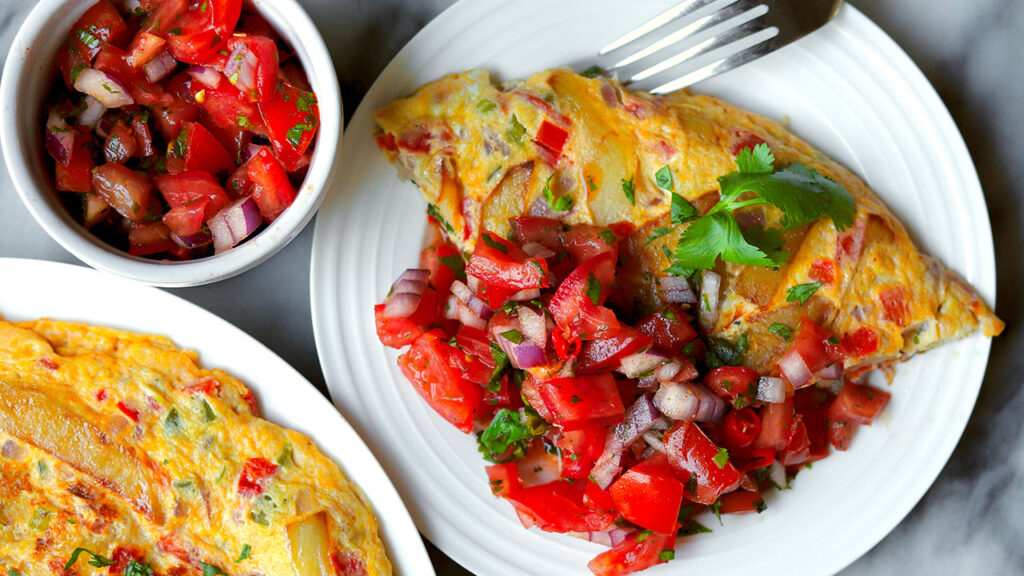
Chipsi is the Swahili word for French fries or chips and Mayai means eggs in Swahili. This Tanzanian street-food staple transforms basic fries and eggs into a hearty omelette with an unexpected crispy texture. Fresh-cut potatoes crisp up before joining beaten eggs and sautéed vegetables, while a side of kachumbari (tomato-herb salsa) cuts through the richness. A filling one-pan meal that comes together in minutes.
Fresh Coconut Water & Sugarcane Juice

The naturally green-colored cane juice and coconut water are not just sweet and relishing, but also extremely nourishing and considered healthy according to traditional medicine.
Coconut water, which is the clear fluid found inside coconuts, differs from coconut milk, which combines coconut water with grated coconut. Coconut water has a slightly sweet, nutty flavor, and is low in sugar and calories.
Whereas, sugarcane is the raw material from which table sugar is made. Sugarcane juice is obtained by crushing peeled sugarcane in a machine. Drinking sugarcane juice is one of the easiest ways to beat dehydration and heatstroke. Sugarcane contains a large amount of glucose along with other compounds. The glucose and other electrolytes make it an instant pick-me-up. Not only does it give you that instant boost of energy, but if drunk when cold, it helps cool down the body.
What are the best local drinks in Zanzibar?
The best local drinks are Juisi ya Mua (Sugar Cane Juice), Juisi ya Ukwaju (Tarmarind), Juisi ya Parachichi (Avocado), Juisi ya Stafeli (Soursoup) & Juisi ya Bungo.
Best food experience in Zanzibar
- Forodhani Gardens Night Market (Stone Town):This vibrant night market is a must-visit for a taste of local street food, offering a wide array of flavors and dishes.
- Lukmaan Restaurant (Stone Town):Known for its authentic Zanzibari street food, this restaurant offers a unique and delicious experience.
- Emerson Spice Tea House (Stone Town):Enjoy a traditional Swahili rooftop feast with a panoramic view of the city.
- The Rock Restaurant:Dine on a rocky outcrop overlooking the ocean, savoring Italian-inspired cuisine with locally sourced Zanzibari ingredients.
- Street Food Tours (Stone Town):Explore the hidden alleyways and local food vendors, experiencing authentic Zanzibari flavors.
- Spice Farm Tours:Learn about local spices and participate in cooking lessons.
Most common spices in Zanzibar
- Cloves: Famous for their sweet and warm flavor, cloves are a staple in Zanzibari dishes and are the island’s most exported spice.
- Cinnamon: Used to enhance the flavor of pilau rice and other dishes, cinnamon adds a warm and aromatic quality.
- Cardamom: Known for its fragrant and citrusy notes, cardamom is a key ingredient in many Zanzibari dishes and beverages.
- Nutmeg: Aromatic and flavorful, nutmeg is often used in both sweet and savory dishes.
- Black Pepper: Considered the “king of spices,” black pepper is essential for flavoring Zanzibari cuisine.
- Ginger: Used to add a spicy and warming flavor to various dishes and drinks.
- Turmeric: Provides a vibrant yellow color and a unique flavor to dishes.
- Chili: Used for adding heat and spice to food.
- Vanilla: Adds a sweet and fragrant flavor to desserts and other dishes.
- Lemongrass: Adds a citrusy and refreshing flavor to dishes.


